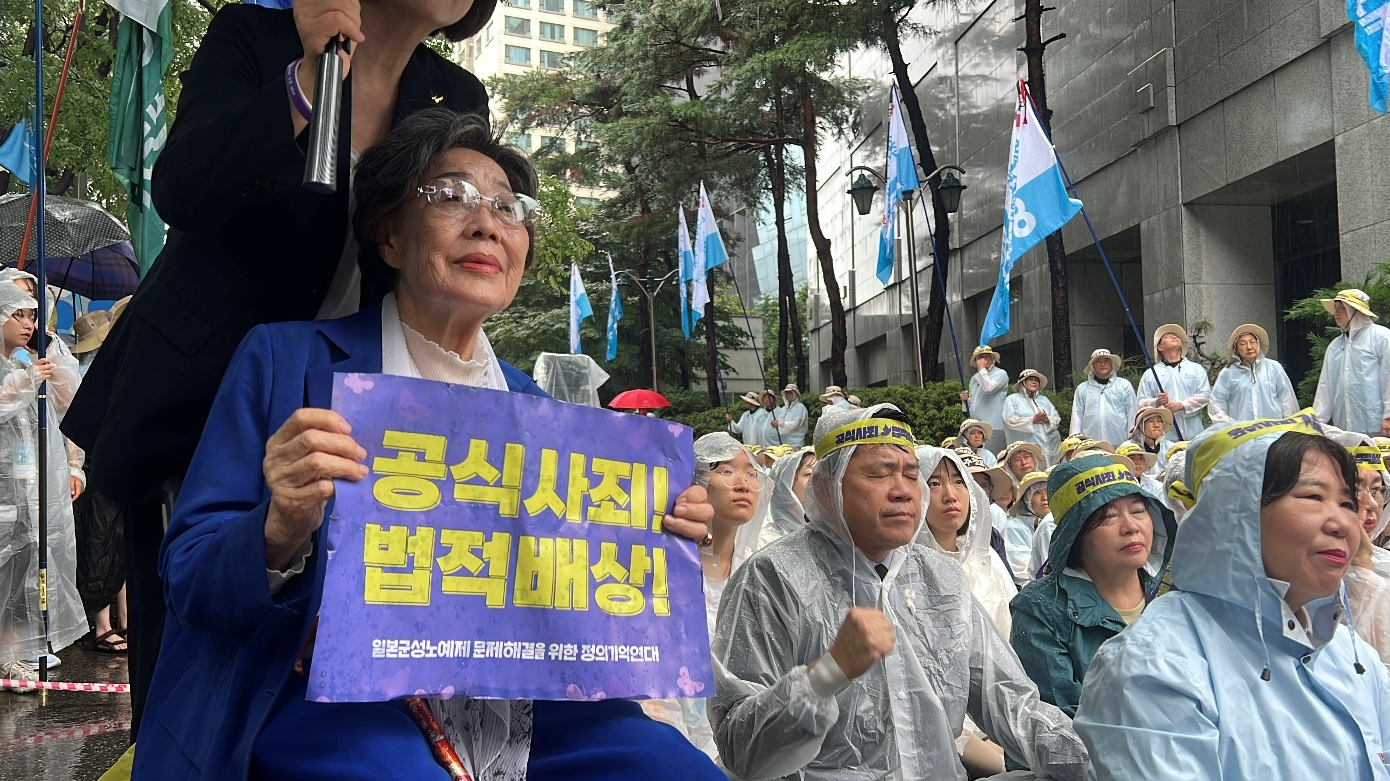
Japanese wartime sexual slavery survivor Lee Yong-soo takes part in a rally honoring ‘comfort women’ in downtown Seoul, South Korea, August 13, 2025. /Shane Hahm
Frail and weak, 96-year-old Lee Yong-soo, a survivor of the wartime “comfort women” slavery system, addressed a crowd of more than 400 people who came out in Seoul in the pouring rain on Wednesday.
“Comfort women” is the term used to describe women and girls forced into sexual slavery by the Imperial Japanese Armed Forces during World War II.
Like every Wednesday over the past three decades, people gathered outside the Japanese embassy in central Seoul holding placards, chanting slogans and wearing yellow ribbons in a rally for remembrance and justice.
“Even with the rain coming down like this, seeing all of you here brings me to tears. Thank you, thank you, thank you,” Lee told the crowd.
The weekly rallies, known as the Wednesday protests, began in January 1992. They have since become one of the world’s longest-running demonstrations. The protesters are a mix of survivors, young activists and supporters, all demanding that Japan issue a formal apology and provide state compensation to all survivors.
This week’s demonstration carried special weight as it came just days before the 80th anniversary of Korea’s liberation from Japanese occupation. It also came just one day before International Comfort Women Memorial Day, observed on August 14. The date marks the day in 1991 when Kim Hak-sun became the first survivor to publicly testify about her experience. Her courage helped break decades of silence and inspired a global movement for recognition and justice.
The Japanese government has acknowledged its military’s involvement in operating a wartime sexual slavery system, but it maintains that the issue was settled through past agreements. Many South Koreans, including the protesters, reject this position. They argue that Tokyo’s apologies have been too vague and often accompanied by statements denying legal responsibility.
In recent years, the movement has faced internal challenges. Yoon Mi-hyang, the former head of the civil group that organizes the Wednesday rally, was accused in 2020 of misusing donations meant to support survivors. Yoon denied wrongdoing but was later found guilty on some charges. Recently, she was handed a special pardon by President Lee Jae-myung, amid public outcry. The scandal damaged public trust, and some survivors distanced themselves from the organization.
According to the director of the International Committee for Joint Nomination of Documents on the Japanese Military ‘Comfort Women’ to UNESCO Memory of the World Register, Shin Hei-soo, the spirit of the movement will continue despite controversy. “If we have will to preserve and teach the next generation, it will survive,” Shin said.
The Wednesday protests continue to draw participants from across South Korea and abroad. Organizers say the movement is about more than history – it’s about universal human rights and preventing wartime sexual violence.
The urgency is growing. Of the 240 South Korean women officially registered as survivors, only six are still alive, according to government data. Activists fear that once the last survivor passes away, the movement could lose momentum.
Still, the chants outside the embassy this Wednesday were as loud as ever: “Japan must apologize!” And the protesters vow to keep returning every week until justice is served.


AloJapan.com